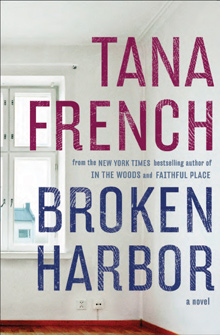Grisly-murder novelist Tana French has an infectious laugh and an easygoing cadence to her voice, something that might surprise you if you've read her novels. Her stories — set in her native Ireland — are filled with wrenching hairpin twists and turns conveyed in eloquent prose that somehow makes you feel better about being glued to graphic post mortems in bed at 3 am. French comes to Brookline Booksmith with her latest, Broken Harbor (Viking), on July 26. She spoke with me on Skype from Ireland.
REMIND ME HOW YOU CAME INTO WRITING AGAIN? I was in theater at the time, and theater gigs never line up nicely unless you're Judi Dench or something, which I never was. So, I had a few weeks off between jobs, and I had the good fortune to get on an archeological dig outside Dublin. I found myself thinking that the woods we were next to would be a nice place for kids to play, and then, instead of stopping there like a normal person would, I wondered, "What would happen if three kids went in and only one came out?" That of course, became the premise for [first novel] In the Woods.
WHAT IS THE PROCESS LIKE FOR YOU IN TERMS OF DESIGNING A MURDER? It always comes from just one image or hook, not necessarily with the actual murder. With Broken Harbor, I was already thinking about the characters and all that, but then we had mice in our house. I went into the kitchen one night, and I saw something small go scooting across the counter, doing a legger under the toaster and behind the cooker. My husband heard me yell, and came out to look, and of course there was nothing there. He kind of made noises about, you know, "Sweetie, it's lovely that you have such a good imagination and you get paid for it, but maybe nothing was there?" [Laughs.] He saw the mouse the next week, but something about it stuck with me. We're in a happy relationship, a strong relationship, and there was nothing else bugging me at the time, but what if that feeling, that sense of invasion that mice can give you, happened to somebody whose relationship wasn't happy and was already under pressure?
 |
THIS BOOK DEALS MORE DIRECTLY WITH HEAVY PSYCHOSIS, WHEREAS THE MOTIVES IN THE OTHER BOOKS WERE MUCH MORE TANGIBLE. WAS THAT A CONSCIOUS CHOICE? Everyone in this book is doing their best, but their minds are fragmenting, slowly. Every character is struggling to hold it together mentally at some point. I think all this had its origins in what was going on in Ireland at the time, with the whole Celtic Tiger boom and the property bubble. . . . We were led into a national mood where reality was not only irrelevant, but unpatriotic. When Ireland came crashing down, people weren't just financially devastated, which is bad enough, they were also psychologically devastated. . . . So I think that seeped into the book on all different levels of madness.ALL OF YOUR CHARACTERS HAVE THAT PIVOTAL POINT IN THEIR PAST THAT DEFINES THEIR ACTIONS. IF YOU WERE TO WRITE ABOUT YOURSELF, IS THERE A PIVOTAL MOMENT YOU WOULD BE ABLE TO PICK OUT IN YOUR OWN LIFE? This comes up at the beginning of Faithful Place actually, where Frank says that most people don't get to see these moments and recognize them for what they are. Maybe when I'm 80, I'll be able to look back and see it. Now, clearly, one that stands out is the decision to work on that dig for a few weeks. A good call! [Laughs.] You just never feel like you're diving into a big moment at the time.